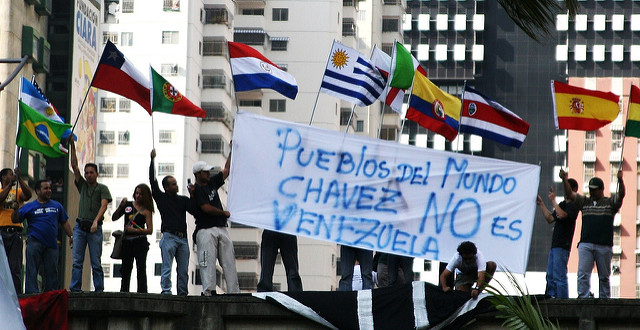21, 17 and 22 years. Those were the ages of the last three young people killed while participating in the protests against the Venezuelan government. Nelson Daniel Arévalo Avendaño, Fabián Urbina and David Vallenilla are the last of a long list of victims, mostly as young as them, who went out to protest against the government of President Maduro, and never came back home: an ever growing list, such as the one regarding abuse, mistreatment, allegations of torture and forced disappearances. But, the determination of those who protest in the streets in an attempt to rebuild the nation and its future, keeps on growing: thousands and thousands of persons, mostly young, who not only ask for food, medicines and work, but for safety that allows them to live and enjoy their youth. Let’s not forget that death in Venezuela walked and continues to walk in the streets hand in hand with crime that has taken more lives than does a war takes, in recent times.
Ever since the marches began on April 1, every day a human river floods streets and highways. President Maduro’s response has been to call for a Constituent Assembly, which means in practice the paralysis, if not the disappearance, of all institutional powers for months and months. And, in the meantime, respect for human rights diminishes. The climate of confrontation, already incandescent, has reached extremes very difficult to reverse. The political debate has been replaced by an increasingly coarse and poor language; the insults of homosexuality against the leader Enrique Capriles reveal the pathetic machismo of an entire ruling class; the videos that circulate, showing the leader of Voluntad Popular, Leopoldo López, in the «normality» of his life in prison, while the government prohibits the visits of his relatives and lawyers, are humiliating. They testify to arbitrariness without limits or rules, as do the actions of the National Guard, the Bolivarian Police and the “colectivos” [armed unofficial groups created and financed by Maduro’s regime]. Simply put, a criminal action.
Venezuelan daily life in any city includes work and marches, market and marches, meetings between friends and marches. Wallets and backpacks are no longer full of the little things each person usually takes with them when they leave home to go to work, but of gas masks, remedies against eye and throat irritation, band aids, bandages, and other first aid items.
No country can survive so much hatred, anger, pain. One friend analyst said that «Venezuela can become the Caribbean Syria»; words as accurate as terrible.
While all this is happening in Venezuela, international diplomacy moves as slowly as a tortoise.
Economic interests set the agenda for foreign ministries. During its last meeting, the OAS demonstrated its inability to intermediate as it should. After several days of negotiations, delegations failed to agree on a joint resolution on Venezuela. Quorum was not reached, despite the fact that a much softer document than the one originally proposed by the 13 countries led by Mexico was written. The latest version only called for the cessation of violence; suppressed the requirement to release political prisoners; and, as for the Constituent Assembly, only suggested reconsidering same.
An extremely soft resolution that, in any case, shattered the aggressive and determined participation of Foreign Minister Delcy Rodriguez, who arrived in Cancun with a delegation of 20 people, ready to use all their weapons to prevent the countries of the Caricom from voting in favor of the resolution. It was enough to remind them of the great debts they have with Venezuela, debts that weigh on their heads like a sword of Damocles. The insults and threats with which the chancellor of Venezuela replaced the delicate diplomatic work represented a bitter humiliation for the OAS as a regional body, demonstrating its errors and limitations. The absence of Secretary of State Rex Tillerson proved another equally bitter reality for Venezuelans, who celebrated Donald Trump’s victory in the past US elections. It became clear that, for Trump, the only things that matter are Cuba and Mexico, that is to say the two countries that allow him to make more noise and have positive repercussions among its constituents; the rest of Latin America leaves him totally indifferent, despite some opportunistic statement.
The international scene is not as dark as it seems though. The countries that voted against the resolution were only five; other six, abstained. These are the poorest and most indebted nations; and, in the Caribbean, we should not underestimate the open and clear position of Puerto Rico, whose governor took a highly critical attitude with the government of Maduro.
Despite the bitter taste left by the last OAS meeting, despite the exasperating slowness of international diplomacy, further work is needed to find a negotiated solution to the country’s crisis. It is the only possible way for Venezuela to emerge from a maze resembling a circle of Dante’s hell.
Photo Credits: Carlos Adampol Galindo


